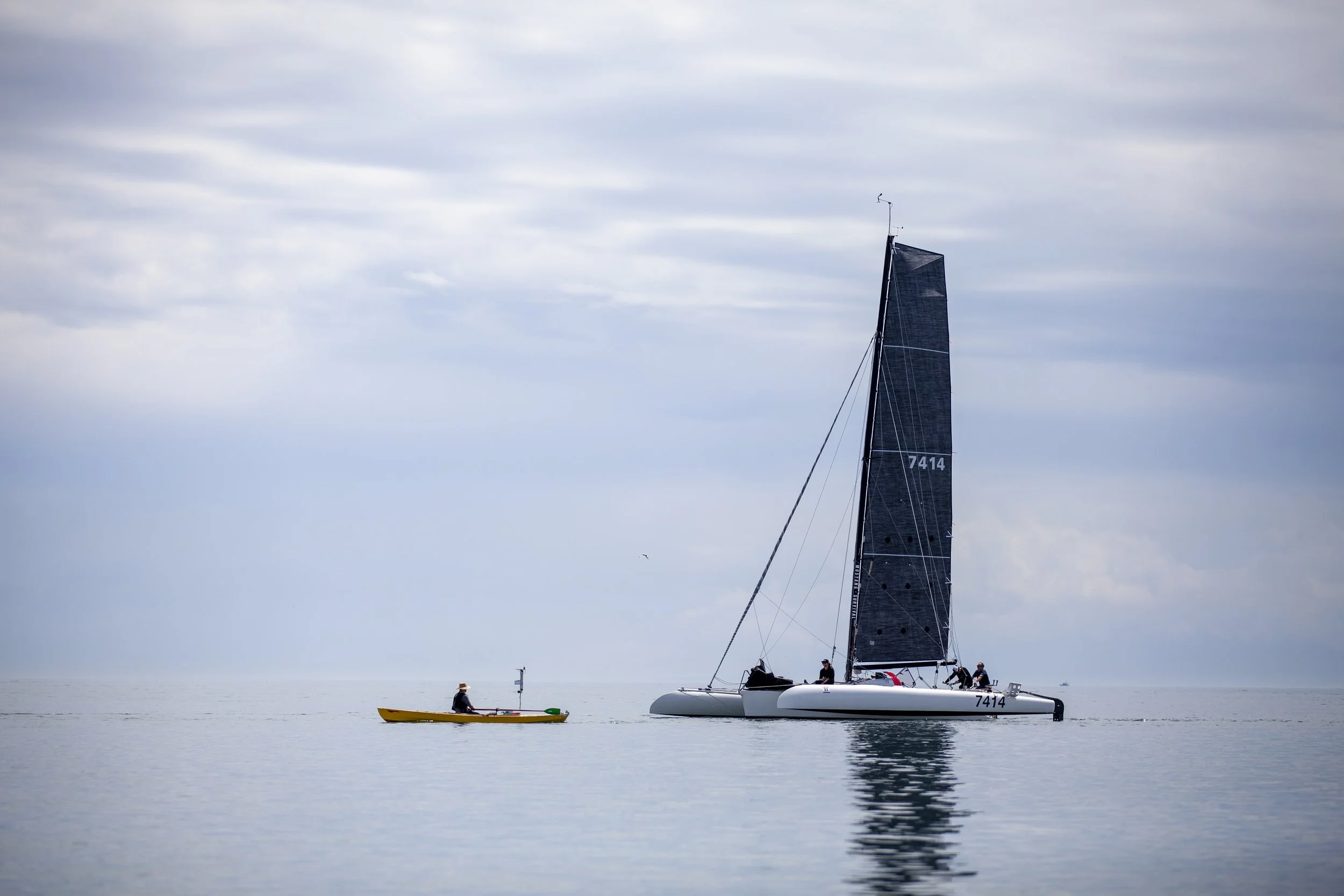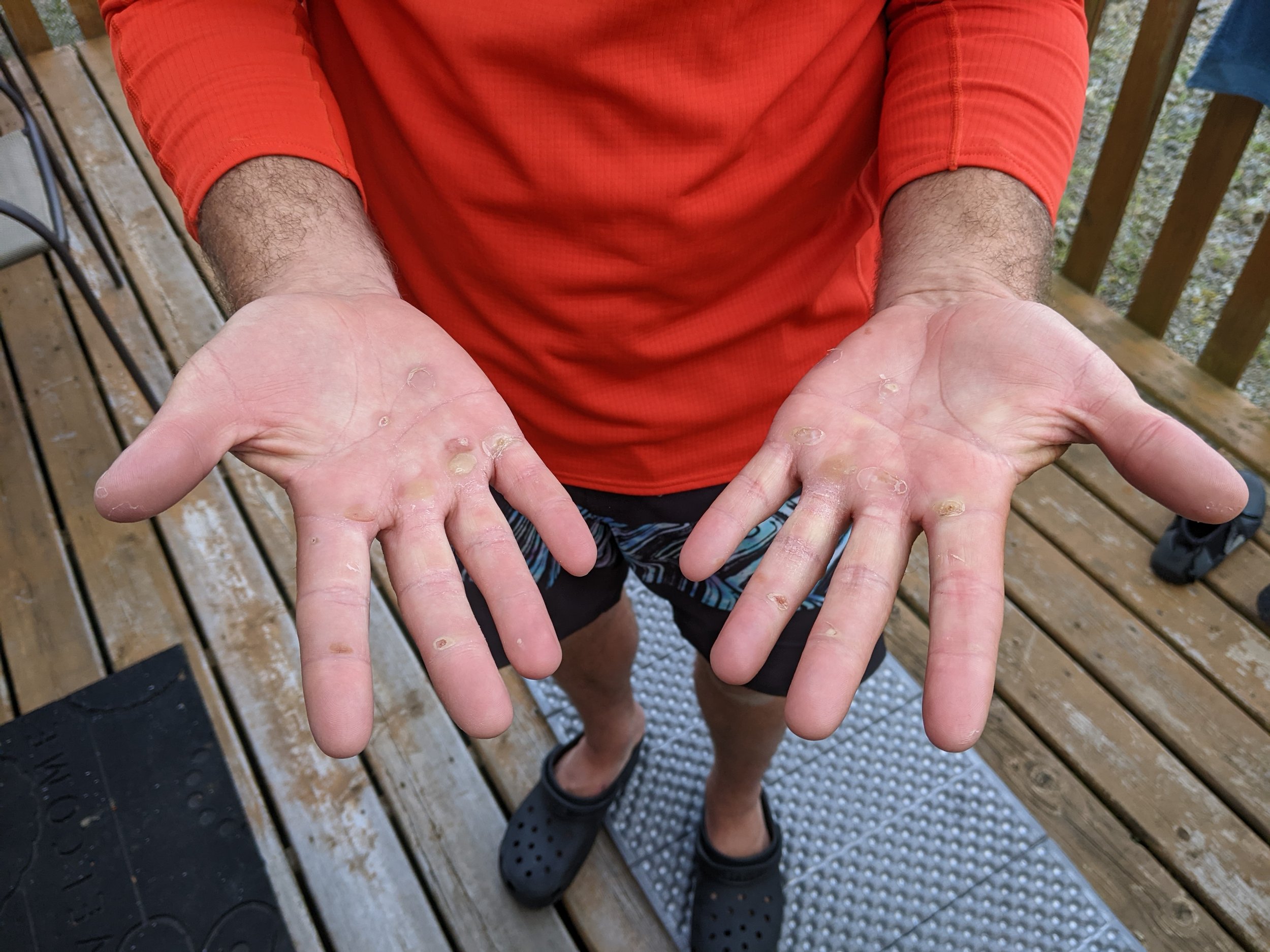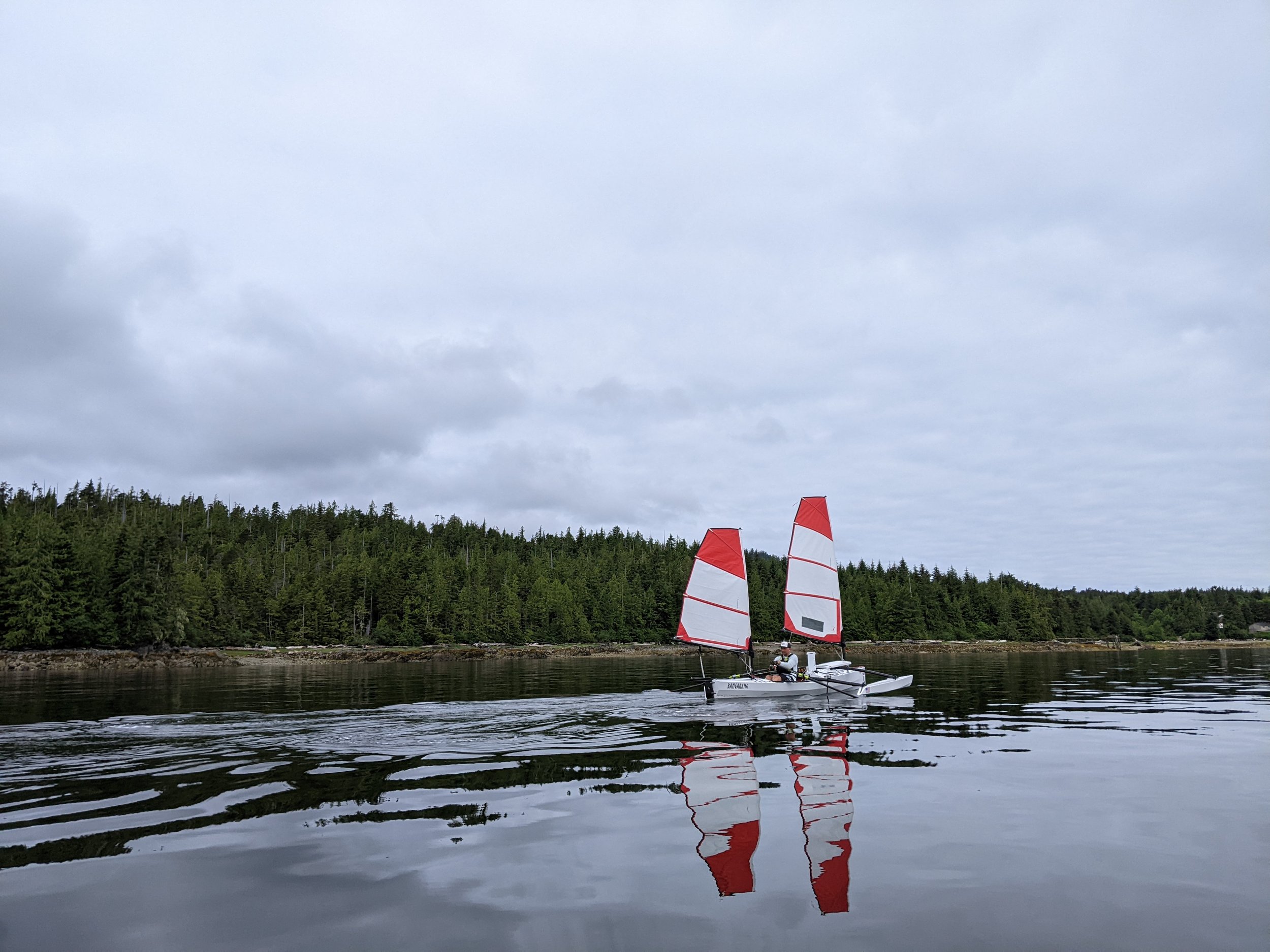The Race To Alaska
The Race to Alaska, or R2AK, is a 750 mile no motor, self supported, boat race that tests the will and grit of everyone involved. It is North America’s longest human and wind powered race stretching from Port Townsend, WA to Ketchikan, AK. The race is split into two stages and must be completed within a four week time frame.
The Proving Grounds, or stage one, runs from Port Townsend, WA to Victoria, BC. These 40 miles of open water include two sets of shipping lanes and an international border. This stage is designed to test the merits of the racers and their boats, anyone who completes this stage, with an intact crew and boat, qualifies to continue on to the full race.
The final stage, 710 miles, is from Victoria, BC to Ketchikan, AK. Other than a required checkpoint in Bella Bella, BC there is no official race course. Most make their way through the Inside Passage, which is often called one of the most beautiful stretches of water in North America.
The thing about The Race to Alaska is that boat size doesn't matter, only gumption does. You can see a tiny single seat rowboat out on the same water being towered over by huge trimaran sailboats.
This year's race started with eight solo teams, this body of work will focus on their journey as their strength and will is tested.
Lillian Kuehl - Team Interstice
The first stage of the race claimed two solo teams and showed those remaining that what they had ahead of them would be no picnic. That gumption that comes with deciding to do a race like this solo was quickly tested. Especially for Lillian Kuehl of Team Interstice.
Lillian Kuehl, Team Interstice, rowed alone for five days after her unplanned racing partner Bob McCall, Team Zen Dog, had to bow out due to serious blisters on his hands.
“So there's this thing that happens sometimes when people are on medications for their mental health,” Lillian said. “They get on medication and their issues are resolved, they feel better. They're like, ‘This is awesome, my issues went away, I think I can wean off of these medications now.’ And then of course the issue reappears because the medications were the solution. That’s how I felt about Bob leaving me.”
After they had met up in Seymour Narrows, Lillian had been feeling better about the race overall. So when Bob left, he took with him some of her newly built confidence. She was facing some of the most infamous sections of the course, including Cape Caution. These five days tried her patience to deal with her fears. She described seeing orcas, and instead of the usual wonderment and joy it would bring her, it just brought dread. Her boat sits so close to the water and has an unfortunately similar shape to that of a seal. So she felt the need to turn on music to make sure the orcas did not mistake her as a potential meal. She said she had never experienced a reaction like that on the water.
“I find I'm really missing my sailboat because my sailboat takes care of me, and my rowboat challenges me,” Lillian said. “Especially being alone, it's like a certain bond with my sailboat, that it's there for me, it's my protector, it carries me. I feed it, I trim its sails, and I do what it needs in order for it to keep going, and then it goes for me. Whereas the rowboat is set up to allow me to make it move through the world. It's not that anthropomorphized bond that you get on a sailboat.”
When Lillian arrived in Bella Bella, BC, on Monday she had already decided that she wanted to go home. But after learning that the next ferry wasn't until Thursday, the uncertainty had time to creep back in. Self-reflection and self-care would be the center of everything with that Thursday deadline in mind.
She was offered a place to stay by healthcare worker Charmaine Lingard who was working with the community in Bella Bella, as well as waiting for her husband on Team Fire Escape to arrive. Lillian was able to dry out all her gear and had a warm place to sleep while she mulled over her options.
Charmaine invited Lillian to her personal daily spot of relaxation and reflection. A long walk down a gravel road led to a spot that nature has reclaimed, after years of hosting a vibrant floating hotel. They took turns chatting and sitting in silence.
The next day Lillian paddled over to Shearwater to find another R2AK team, Fix Oder Nix, that had stopped there for the night. At the start of the short trip, she expressed that maybe she should carry on to Alaska.
But by the end, she was again leaning towards going home. Her self-care in Shearwater included buying and filling out postcards for loved ones, comparing battle wounds with Team Fix Oder Nix, and chatting with some adoring race fans.
That night she thought she might keep going, she even spread out all her food on the living room floor to plan, but then woke up the next morning and said “Just no. My heart is just not there. I’m going home.” Her dad always tells her this saying when she's upset, “Things will be better in the morning.” She said if she wakes up and things aren't better in the morning, she takes that as a pretty genuine sign that something is off. “I might wake up creaky and not wanting to leave my warm bed, but then there's also this powerful aversion to what I thought I wanted to do, and that was my feeling this morning.” So she spent a quiet day in Bella Bella, with the nagging feeling of decision-making off her mind. She organized her things, finished writing her postcards, ate popsicles, and prepped her boat for the ferry ride.
“I did Johnstone Strait, I did Seymour Narrows, I did Cape Caution,” Lillian said. “That’s good, those are all the steps to Ketchikan. I could keep going on to Ketchikan, but I just don't want to. I don't want to be alone. I don't want to be afraid.” She said people might tell her that she’ll regret it if she stops now, but she thinks it's also possible to regret it if she keeps going. “It could affect my relationship with my boat, with the water,” she said. “It could make me not want to be out there again.” Having the time and space in Bella Bella created the opportunity for Lillian to really think about why she was in the race, and what she was willing to put herself through.
“To get yourself all the way to Alaska, they say it comes down to a broken boat, a broken body, or a broken spirit,” Lillian said. “Saying that my spirit is broken feels a little harsh; I am a complete human with many dreams, aspirations, and a spirit.”
James Gibling - Team Bangarang
James Gibling of Team Bangarang says he found out about the Race to Alaska by accident. He was looking for a boat that he could row and sail, and he just happened to see a picture of Colin Angus standing up in a little boat, an Angus RowCruiser. He felt that this setup was exactly what he was looking for. After chatting with Colin he learned that the boat was originally designed for the Race to Alaska; the first R2AK run with this boat was done by Colin himself, who made the trip in less than two weeks.
When James first decided to build this boat, his dad, Norman Gibling (Gib), was battling cancer. Norman, who lived on a boat for 21 years and worked with wooden boats when he was younger, was thrilled to see James take on this project. It was a stitch and glue boat, so he couldn't help James with a lot of the work, but he helped cut all the copper ties to stick the boat together.
“I feel like the spirit of this race is to build your own boat,” James said. “I can turn plywood from home depot into a boat that can take me to Alaska.”
It’s in James’ blood to make something out of very little. His dad used to say that anyone can just go out and buy something, but you're really a craftsman if you can take something that's not even designed to do what you need it for and make it work. “If you can surf a door, then you're truly a surfer,” Norman would say. At 16 James received a beat up longboard as a gift from his dad, and they fixed it up together.
Norman would say that a really skilled person doesn't need something fancy to make it work. James said he received a ton of great tips and advice from his dad while building the boat. Unfortunately Norman did not get to see the boat completed, but James said he knew where his son planned to go with it and was so excited for him.
James knew nothing about rowing before building this boat. To learn, he watched YouTube videos or filmed himself and sent the clips to friends to critique his technique. He was so impressed by the row teams this year. He said that at the start he figured he would be able to keep up with the rowers, but quickly realized how dialed in they were.
“They are just in a whole different league,” James said. “So if I could be within a hundred miles of their shadow I would be doing good.”
James made it to Bella Bella on Thursday and had already decided that this would be his last stop in the race. Even with blistered hands he said his body and spirit were fine, he was just simply out of time.
He was however surprised to be the last solo standing, and said he was a bit bummed that no solos would finish this year's race. He talked for a while with Lillian Kuehl of Team Interstice about what it was like to be a solo racer; she had also decided to end her run the day before. They were the last two solos in the race.
“Conditions weren't even super terrible this year, it was just that they were consistently not favorable,” James said.
James said that he probably wont do the race again, but he and his wife are planning to come back and kayak the Inside Passage. He joked that he'll ring the bell in Ketchikan, even if he has to bring his own. He says he’ll finish the race, just on his own timeline.
“I think there’s something about putting your own spirit and energy into something and creating your adventure,” James said. “The trip didn't start in Port Townsend, and if I made it ten miles, or fifty miles or a hundred miles, this was just an excuse to go see this awesome part of the world in a homemade boat on a homemade adventure.”
Bella Bella - The Unexpected Stop
To me, Bella Bella, BC, simply marked a place in the race where I would no longer have the option to spend time with the teams. I was told that if I wanted to camp with anyone, it had to be before Bella Bella—that is where our resources ended. Because I knew from the start that I would not set eyes on that place, I never gave it much more attention than being aware of its position on the race course. After our, admittedly luxurious, support boat broke down in the Broughton Islands, I figured I would just be heading to Ketchikan to wait for teams there. But a phone call later, I found myself with a plan to travel to Bella Bella. I suddenly felt very undereducated about this place I would be traveling to, so I did what every teacher always tells you not to do, I read the Wikipedia page.
Two of the six paragraphs focused on the moving back and forth of the post office location and how it affected the town name. The rest shallowly explained where the town is situated along the Inside Passage and the industries that have come and gone over the years. It labeled the land as “an unincorporated community and Indian reserve.” As those teachers would have predicted, I learned very little from the page, and definitely did not have a good grasp on the Heiltsuk people that lived there.
My only contact in Bella Bella was Charmaine Lingard, a maternal children’s health nurse, who had been coming to the island since 2016. Her husband, Stuart Sugden, had been a physician at the hospital in years past, but this year would be returning to Bella Bella as a pit stop in his Race to Alaska as part of Team Fire Escape.
Because this option wasn't one I had planned for, I called Charmaine to ask her if it was indeed a possibility for me to come stay with her and document the racers that would be coming through. The conversation was not what I expected it would be.
Charmaine said she would absolutely facilitate me coming to Bella Bella, but that I needed to understand the community was currently going through an intense mourning period, as there had been recent unexpected deaths. She described hours-long funeral processions and bans on any kind of celebration.
She had been the only local resource for the boats that had already come through the area. She would watch the tracker, while also trying to meet with her clients, so that when teams arrived she could explain the situation in the town and shuttle them off to her house to shower and do their laundry without causing a disruption to the community. In past race years there would be celebrations and banners when teams arrived in Bella Bella, but this year it almost seemed like a necessity that they have no presence at all.
“I was very impressed with all the boats that landed here,” Charmaine said. “Once I had a chance to explain the situation, they were all incredibly respectful.”
I got a small taste of that when I landed in Bella Bella last Sunday, not because I needed to not be seen, but because Charmaine was in the middle of her work day. She scooped me up from the airport and dropped me off at the house, and I wouldn't see her again until late that night. Many teams had already gone through by the time I arrived, only six had yet to make it there, but Team Oaracle landed the same day I did. I was able to meet them at the dock, explain the atmosphere of the town the best I could, and document their short time there. We all chatted for a while, Ian restocked some supplies, and then they headed out.
This gave me a chance to walk around the town and try to get my bearings. Every single person that drove or walked past me said hello or waved. I was surprised to feel so welcomed by a community that I knew was in crisis. It felt friendly there, but it also felt a bit off. People waved but nobody smiled, the whole town just felt heavy.
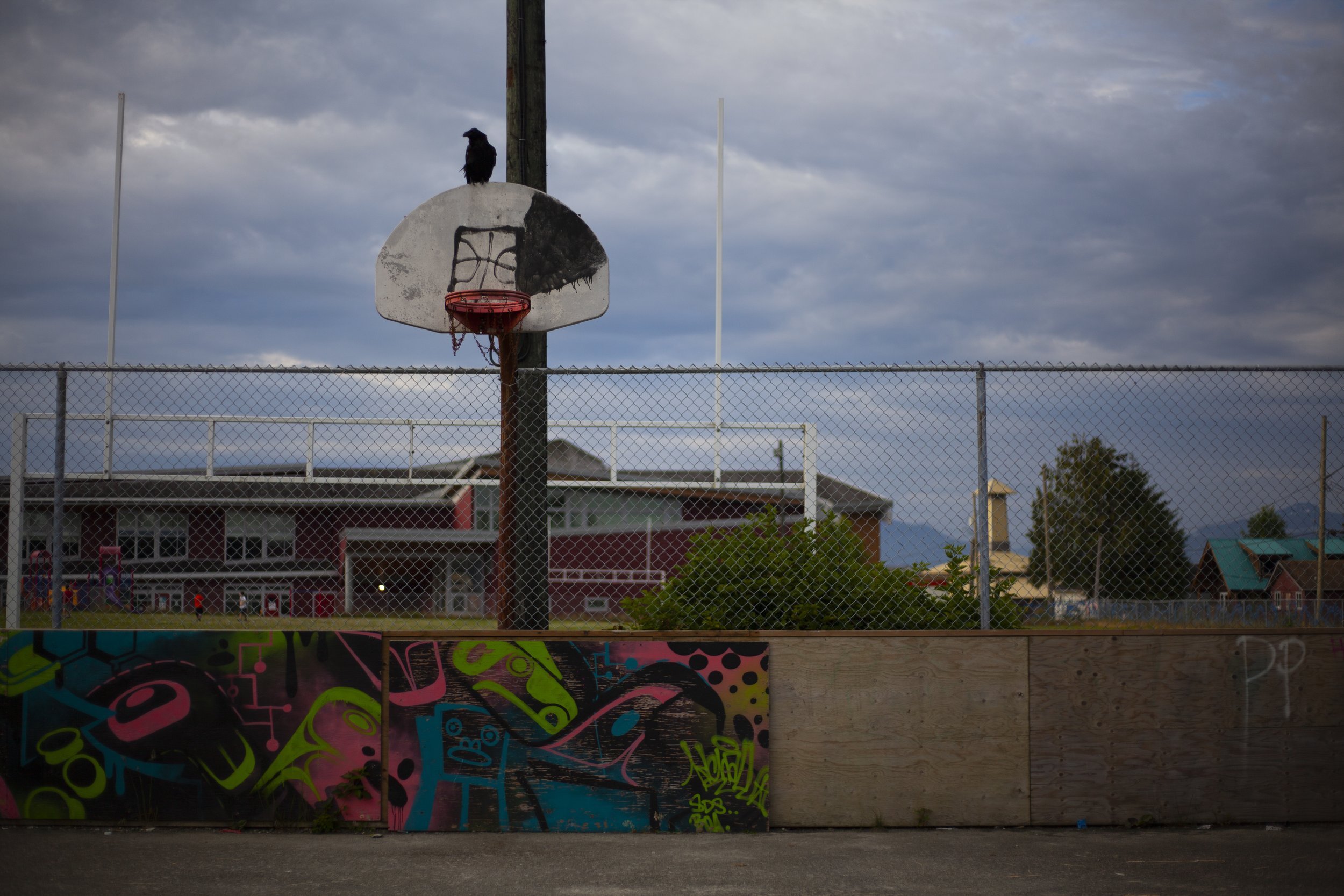
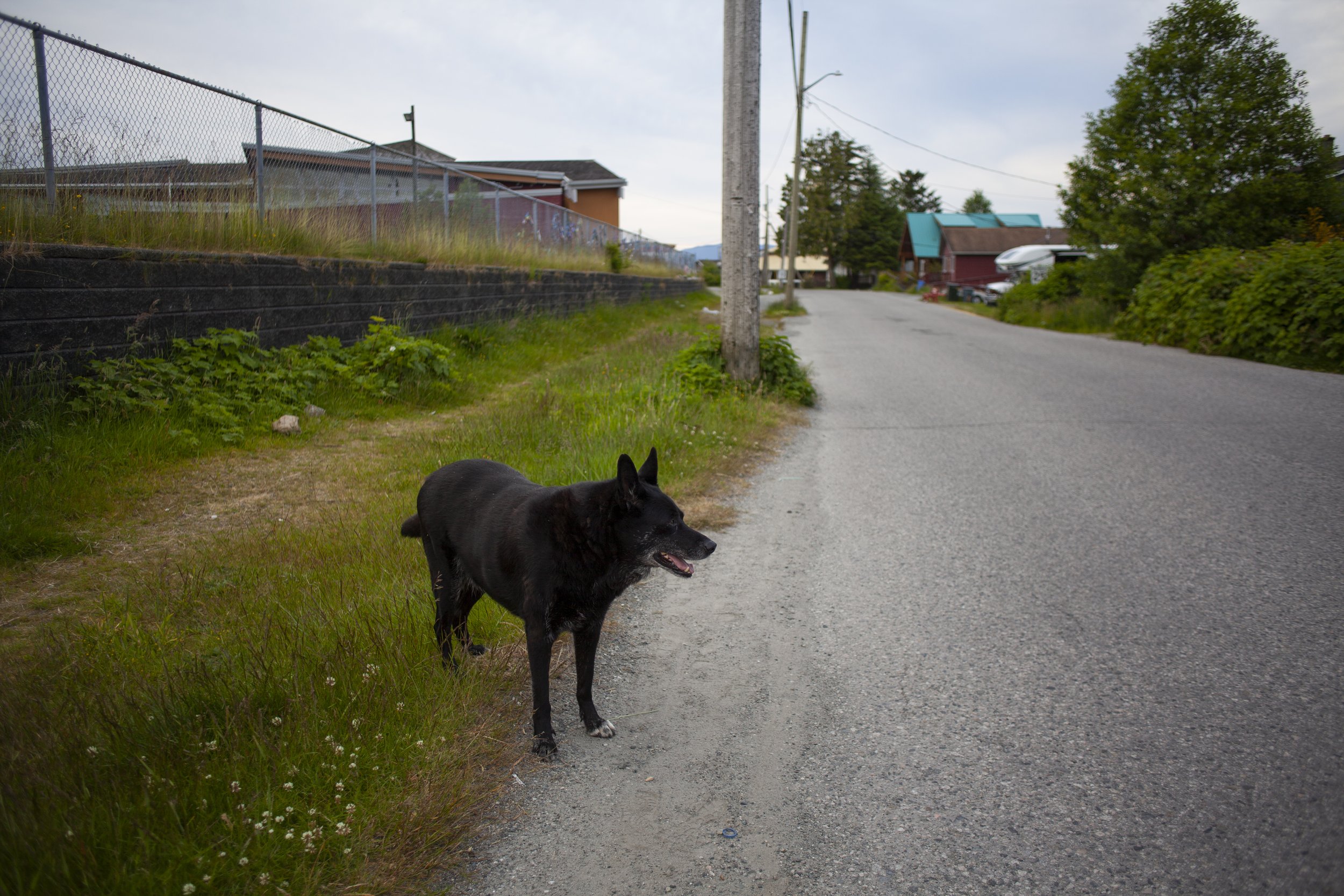
When Charmaine got home that night I finally got the details that I needed to start understanding what the community had been going through since the start of the pandemic.
During the early days of the pandemic, the community leaders implemented a strict lockdown to try to keep their vulnerable community safe. Charmaine estimates that three in four adults in Bella Bella would be considered immunocompromised for one reason or another.
“For all intents and purposes, the island was shut down,” Charmaine said. “All the people you see out fishing every day could not leave. You could not gather or walk around town; it was a complete and utter lockdown.”
She described people having color-coded cardboard sheets that they would put up in their windows if they needed help. Groceries would be delivered to them and left outside. No house calls were allowed at all.
“I was doing home visits through the windows,” she said. “People were holding babies up for me to see through the glass.”
Only services deemed essential by the Heiltsuk Tribal Council remained open, including the health center where Charmaine works, the hospital, and the grocery store. The whole high school was made up into an emergency COVID ward because they just didn't know what was going to happen. This was all at a heightened alert state; COVID had not yet found any footing in the community.
They stayed COVID-free until late 2021 when it was introduced to the community after some people had traveled for a basketball match. Charmaine said it then swept through the community at an incredible speed; luckily Bella Bella has one of the highest vaccination rates of reserves in the area.
“They did an amazing job getting the whole community vaccinated,” Charmaine said. “That's the only thing that kept them from experiencing high casualty rates.”
Not only were lives lost during this time but the culture of the community was severely impacted. Like everywhere else, graduations were postponed, birthdays passed with no parties, babies were born with no family gatherings. But their mourning process was also interrupted, they could no longer gather and share in their grief.
“They are incredibly culturally oriented,” Charmaine said. “Everything is shared. If anyone dies they have a mourning room with up to 50 people inside, and they weren't allowed more than five.”
Charmaine believes that having that community gathering aspect taken away was the trauma that hit them the most. She said that the songs they normally sing for the dead weren't allowed. They had masks on, so they could not do the required facial expressions. And that normally following each death they would have up to four ceremonies, spread out over a year until the tombstone is placed. This became an impossibility. Families had to decide to just cremate their loved ones because time and space issues would not allow them to follow out the person's wishes. The island used for burial is full, and it takes time to consecrate a new plot of land for proper burials.
“The rule is normally that if there is anything you want to celebrate during the mourning period, you have to get permission from the families to do it,” Charmaine said. “Because there were so many deaths, the elders and the language keepers decided that they don't want to do any celebrations.”
No one could move on. Even when the fears of COVID would start to subside for a time, there was just no catching up with the amount of mourning that still needed to take place. It wasn't just COVID deaths that the community had to deal with; there is always a yearly death rate. But between the start of 2020 and June of 2022, Bella Bella had lost 92 members. That’s almost ten percent of the community's population. Just in the last two weeks of June, the community lost seven members, including elders, a 50-year-old who died of a massive heart attack, and two brothers who died in a house fire.
“They've gone to hell and back,” Charmaine said. “One of the elders said to me, ‘I’m an empty shell, I can't do my mourning songs, I've got nothing left, and I'm too scared to look on Facebook because I'm scared to see who's dead.’”
This is the climate that R2AK came through this year.
Stuart and the other members of Team Fire Escape were well aware of what the community had been dealing with, and originally said they didn't even want to stop in Bella Bella out of respect. He asked Charmaine to speak with the elders to see what they would like him to do, and ultimately they were happy to have the team stop there. It would still be a few days until Team Fire Escape would arrive. Next to make it to Bella Bella was Lillian Kuehl of Team Interstice on that Monday.
She arrived with the feeling that she might end her race in Bella Bella, so Charmaine brought her out to one of her beloved spots of peaceful reflection. Lillian cooled her feet in the water and Charmaine went for a swim.
While Charmaine floated in the shallow waters she told me about the tall tree on the water's edge. It had prayer flags hung on its branches. She said this is her place to come and think, and wash away the stress of the day. It’s her self-care. She says she is not a spiritual person, but she had been thinking about an experience she had two days earlier.
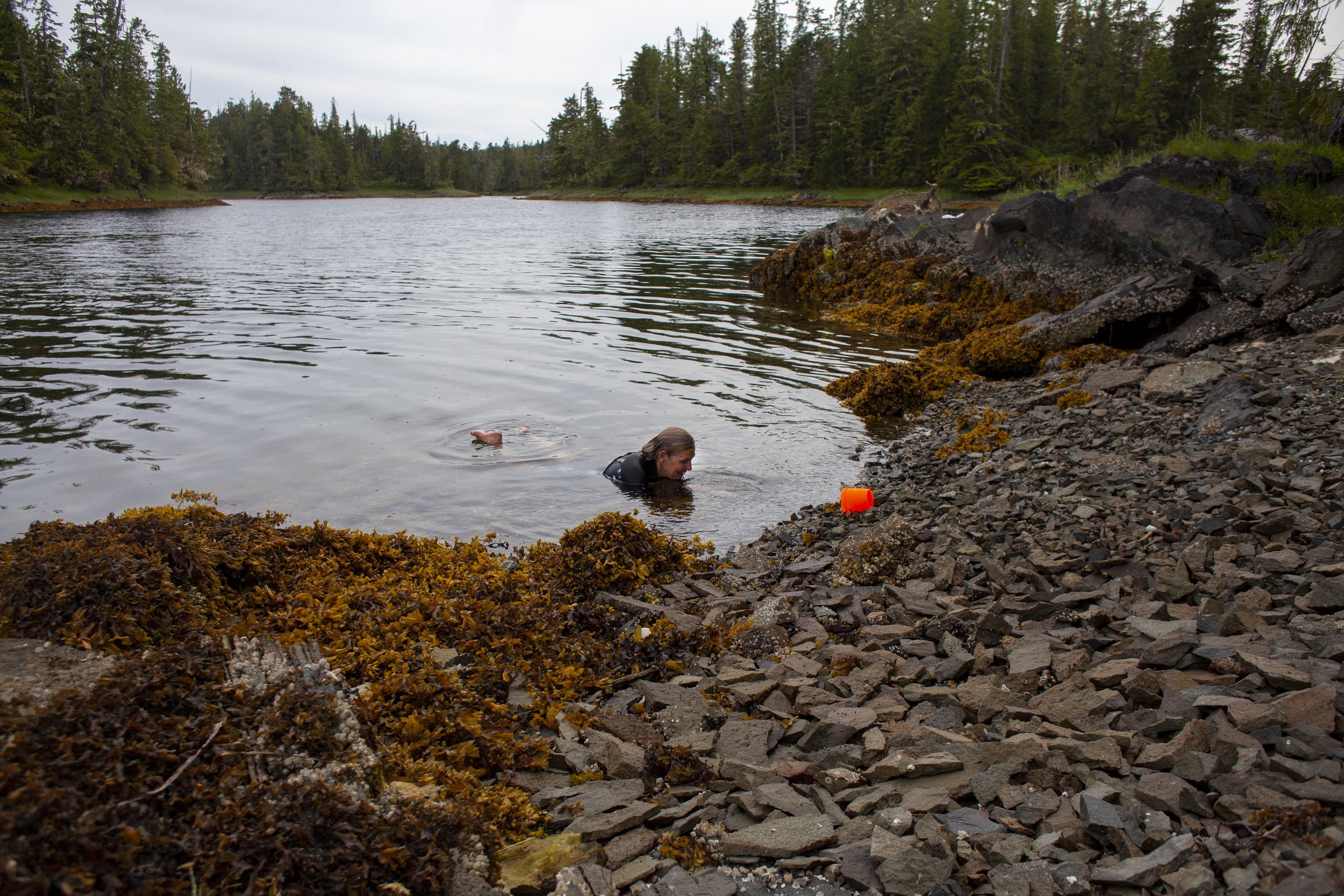
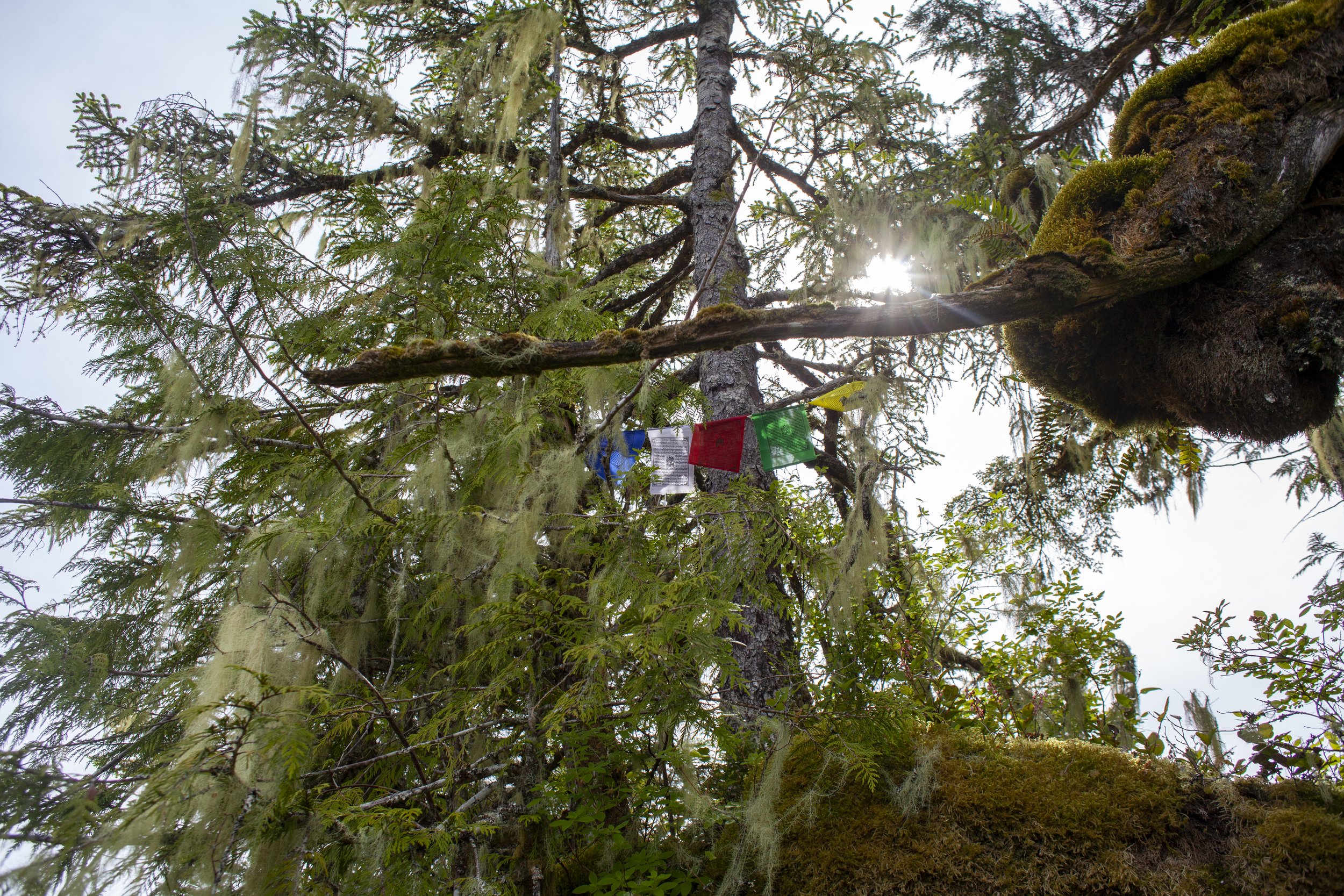
The elders had decided that they needed to perform a cedar washing ceremony for the first responders and anyone that felt they were a part of the grieving process after the house fire that claimed two lives. The Big House was full of people there to witness and partake in the process. A fire was burning cedar wood in the center of the room and an arch made of cedar branches was built just beyond the fire. Charmaine describes the process like this: “First you are given a gift, then you walk around the fire and through the arch. Then the women brush you with cedar branches, they turn you around and whisper a message that they think you need to hear. The Chief oversees the process, and then you walk out.”
Charmaine said she only watched for a while, did not participate, and then went back to her office across the street.
“It's happened before but I never thought that I should go and see it,” she said. “I'm a Caucasian, African, Australian—it wasn't meant for me and lots of the staff also felt that way.”
But after the main ceremony was done, a group of traditional healers, who had been flown in to perform cedar washings for anyone in the community, came over to the health center and offered it to the staff.
John, one of the traditional healers, sits in front of the Big House. He was flown in from Nanaimo to offer cedar washings to members of the community experiencing grief.
“It was quite uplifting, you felt very strong,” she said. “You just have to let yourself go through the motion, let the feelings in.”
She said that an experience like this one, and time spent with witch doctors in Africa, have proven to her that she knows enough to know that she knows nothing.
“It doesn't really matter what you believe; it's just the outcome that matters,” she said. “I felt that the building was a lot calmer after the ceremony.”
On Tuesday things started to change a bit in the town. The elders were starting to give permission to families to have small celebrations. The first of which was a happy birthday sign that appeared out front of the grocery store.
I started to notice small groups of people gathering all over town just to chat, and there was suddenly a buzz in the air. Now when people waved or said hello, their faces started to have warmth to them.
“It felt like everyone was just starting to emerge from their holes,” Charmaine said.
Over the next few days, those faces just got brighter and brighter. On an early morning walk past the grocery store, I heard music playing for the first time since I arrived; the song was Eye of the Tiger. Later that day while sitting inside, I heard dozens of cars coming my way honking their horns. When I got outside all the cars were covered in balloons celebrating the recent high school graduation of six students and two Heiltsuk language graduates. All graduation ceremonies had been called off since 2020. The next few teams were due to arrive any time now, and the possibility of having a small celebration for them was becoming more real.
Charmaine said that everyone at the health center and the hospital had been following the race and listening to her stories of the teams she had met so far. You would catch glimpses of the race tracker open on people’s screens, and a sign was hung up saying, “Don't bring any laundry here, R2AK laundry is being done at the health center.”
“I had the laundry hanging up everywhere at the center and everyone was dodging under knickers and bras,” she said. “They would say, ‘This is great to see because we feel like someone out there is finally living,’ So for our little building it was wonderful to have the race here.”
When Team Fire Escape and Team Bangarang arrived on Wednesday, a small group of people had gathered on the dock to greet them. Charmaine said that it was the first time anyone had used a drum in celebration since the recent deaths. Over the next few hours the teams all caught up with each other, and Stuart had a chance to step foot in Bella Bella again.
Bella Bella ended up being the last stop for three of the six teams that went through the territorial waters while I was there. For all of us that were welcomed into this place, it seemed like a time that just naturally slipped into reflection. It gave us all a chance to stop, breathe, and think.
“It's an amazing place,” Charmaine said. “When they welcome you into their lives, like they have myself and my husband, you feel very privileged.”
Charmaine said she is often asked why she keeps coming back year after year. She feels that if you support and strengthen a mother, she will strengthen her family, and the family will strengthen the community. She says that she has seen them taking control of their culture, revitalizing and empowering it. That they have some extremely strong female leaders that know the law, know what they are entitled to, and they stand up for themselves. They have kept oil barges out of their waters and stopped gas pipelines from running through their land.
“They are prepared to show the culture. It’s a live culture here,'' she said. “You'll come in and you see ceremonies and you see tradition. It's not just put on for tourists; you integrate into the culture from the minute you step into this land.”
I hope to come back someday to see the community thriving and gathering and sharing, and to learn from them in their own words when they have the capacity to share. I feel honored and humbled that I was welcomed to spend time on Heiltsuk land and with the people that call it home. It’s a privilege that I won't soon forget.
